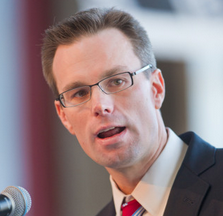 CHICAGO — At the end of last year, the Illinois General Assembly found itself in uncharted territory.
CHICAGO — At the end of last year, the Illinois General Assembly found itself in uncharted territory.
In response to an ongoing crisis of gun violence in some of Chicago’s poorest communities, Mayor Rahm Emanuel asked Illinois state legislators for increased mandatory minimum prison sentences for illegal gun possession.
This was textbook tough-on-crime politics and policymaking. At the beginning, I think everyone involved in the process assumed it would all proceed according to script.
Even though my organization, the John Howard Association, was an early opponent, I also assumed that after the dust settled at the end of session, Illinois would have another set of longer prison sentences.
Except that’s not what happened.
The opposition at first trickled and then came flooding in from different directions, from the NRA to criminal justice reform advocates.
As the legislation stalled, another surprising thing happened. A policy debate erupted in state and local media about the pros and cons of sentence enhancements, the likes of which I don’t think Illinois has ever seen, including when it abolished the death penalty.
By the end of the state’s veto session in November, not only was the bill dead, but it also seemed as if the standard tough-on-crime approach to criminal justice policymaking had been called into question.
At the end of the process, legislators who argued both sides of the bill proposed a resolution to create a Joint Criminal Justice Reform Committee. The purpose of the committee is to explore how Illinois could improve the fairness and effectiveness of the state’s justice system. But I’d argue it’s also to figure out where criminal justice policymaking stands in Illinois.
As the committee begins its work, one of the arguments I will make is that they should continue to look for opportunities to address the crisis of gun violence that plagues Chicago’s poorest communities.
But first I think it’s critical that the committee understand what this crisis is really about.
After a typical weekend of shootings, Chicago officials explain that the crisis stems from too many guns and not enough punishment, and that to address these problems, legislators need to pass stricter gun laws and mandate longer mandatory prison penalties.
This explanation not only confuses symptoms with causes, but it also leads legislators to double-down on failed and expensive policies. The threat of longer prison penalties is not an effective deterrent — it will only increase the time people serve in our already overcrowded $1.3 billion prison system, spending money we don’t have on a response to crime that doesn’t work.
To understand the true causes of Chicago’s crisis, the committee should engage people who live and work in the communities that are most affected by gun violence. They should talk to someone like the Rev. David Kelly. For more than 30 years, the Roman Catholic priest has worked with young people in the deep end of Cook County’s justice system. And since 2000, he’s run Precious Blood Ministries, a kind of safe haven for youth in Chicago’s Back of the Yards, one of the city’s most violent and impoverished neighborhoods.
A few weeks ago, I asked him what he thought was behind Chicago’s gun violence. He told me the availability of guns is part of the problem, but the causes of violence are deeper.
“We have too many youth who are operating out of a sense of not having any worth — that is pretty much what they have heard — and too many have bought into it. They have all experienced serious violence and so are dealing with significant trauma and the effects that come with it, he said.
“And so what you have are young people who are carrying a deep sense of shame, who are traumatized, who have nothing to do, and nowhere to go.
“Then throw in the easy access to guns — that is a dangerous combination.”
This is the real crisis that is afflicting Chicago’s most violent communities.
And with this understanding, the Reform Committee can find meaningful opportunities to improve the state’s justice system and its response to crime.
Its members should reject proposals that would merely send people to prison for longer periods of time, exacerbating an already vicious cycle.
Instead, they should find ways to reduce our costly reliance on incarceration and invest in communities like Back of the Yards and the lives of the people who live there.
John Maki is the executive director of the John Howard Association, Illinois' only juvenile and adult prison watchdog.
A version of this op-ed originally appeared in the Chicago Sun-Times (http://www.suntimes.com/news/otherviews/28607962-452/stopping-violence-starts-with-hope.html)

I suggest each of the suggested actions is appropriate, not as the solution, but as a necessary part of any truly successful efforts. I have no first hand knowledge of the any specifics related to the violence in Chicago but it is clear that guns are merely an overt symptom of the real problems and that even a wildly successful program to eradicate the possession of firearms/knives/poisons/clubs from the Chicago area will not have a significant impact of the underlying problems other than to change the method used. I do know no major societal problems have been ever been reasonably addressed by knee jerk or simplistic actions that may have sated the desires of some for action but did not address the root causes of the problem(s). Folks such as the Rev. Kelly and other seasoned veterans with whom he has probably worked are essential to finding workable solutions of finding and effecting a cure to the local violence. Unfortunately, many of these same well intentioned, good folks are also part of the problems in that they come with deeply ingrained beliefs they have already found solutions and they tend to not be as open to opinions not earned on their front lines. A definitive, successful effort will require the continued efforts of folks like the Rev. Kelly, of behaviorist’s who are willing to look much deeper into the root causes of the attitudes which are evidenced in the violence and help find successful strategies to adequately address those root causes, and then someone has to find a way to pay for the implementation of those strategies. At all stages, there are significantly divergent interests who must find a way to work together for a common purpose. History suggests that is a pretty tall hill to climb but when enough folks work together magnificent things can be accomplished.